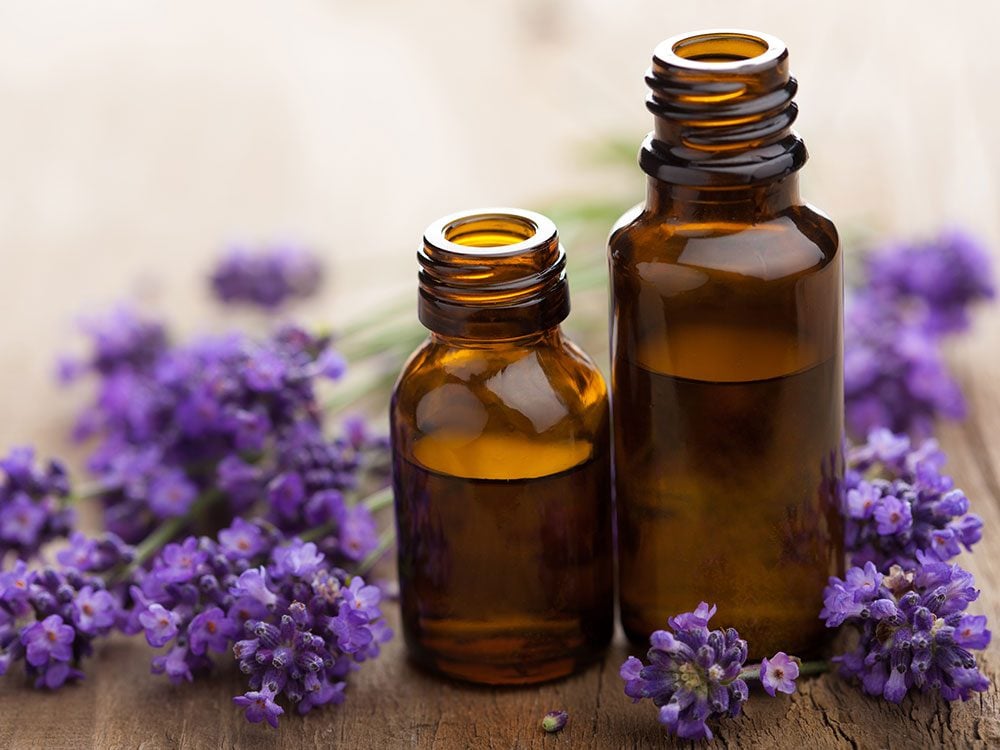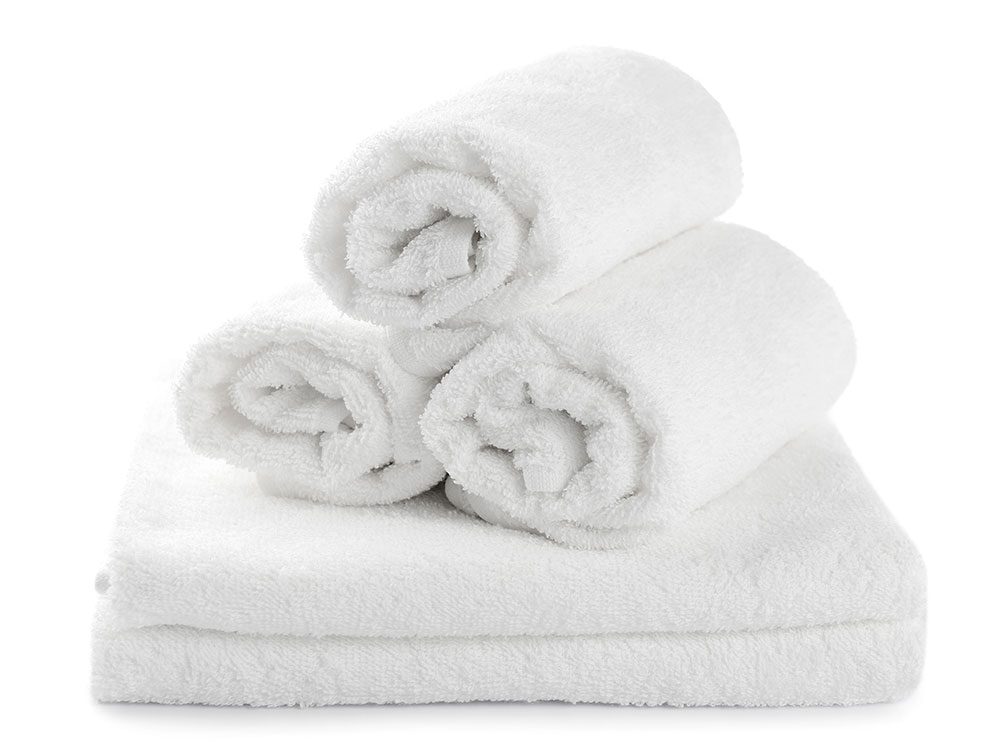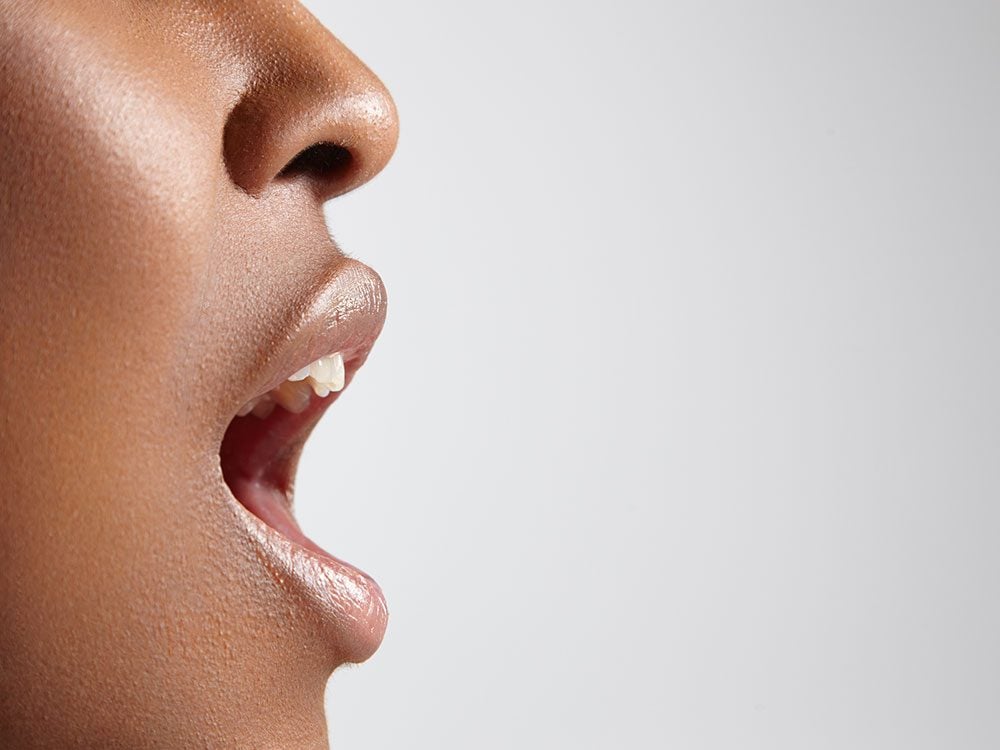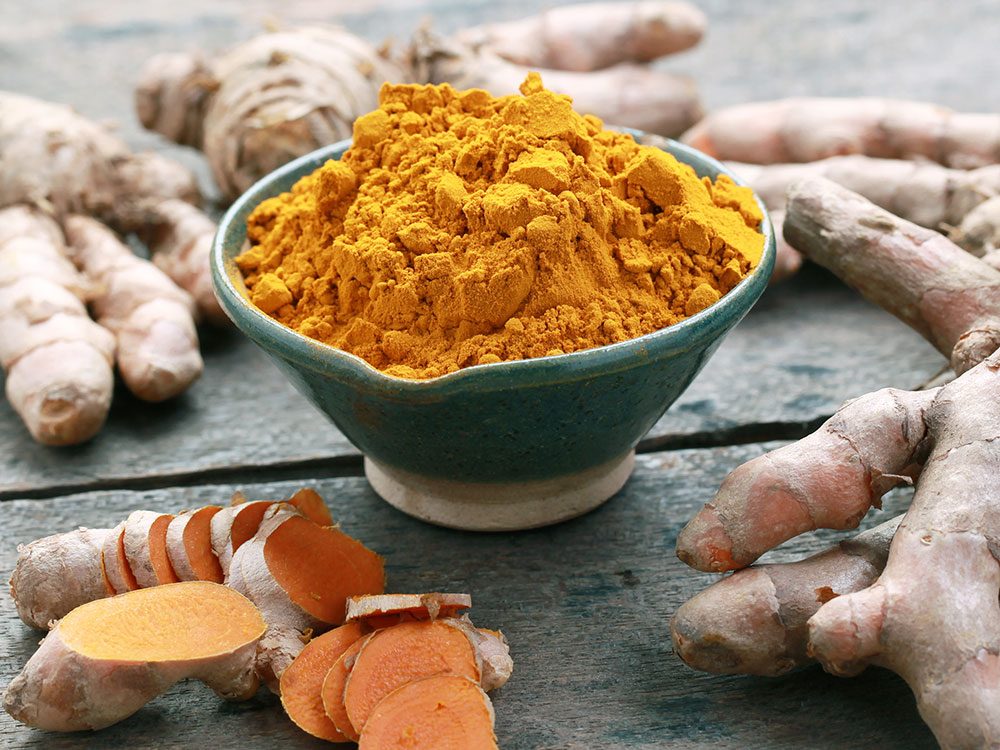
Lavender essential oil
Sure, lavender smells good. But the alluring scent also has a calming and soothing effect on the nervous system. Just think of all those lotions and oils labelled “relaxing” that you see in the beauty aisle. Here’s a trick to try if you’re constantly grinding your teeth (also called bruxism) at night from Pat Brunson, a massage therapist: “Put a couple of drops in a small spray bottle of either distilled or reverse osmosis water,” she suggests. “Then right before bedtime, spritz a couple of sprays on each side of your pillow where it can be inhaled as you are drifting off to sleep, and the lavender essential oil will relax your body so the facial muscles relax more as well.”

Bite guard
You might feel awkward at first when you hit the hay looking like a hockey player, but a custom-made bite splint to wear overnight can reduce grinding and prevent damage to teeth. When done at the dentist’s office, your dentist (or her staff) takes impressions of your teeth and a bite guard is made to fit perfectly. You can also DIY one if you’re looking to save money. To make your own, purchase a high quality dental sports guard, shares Peter Drews, DDS, MAGD. “Once the device is molded to your mouth, trim the guard short so it covers your canine teeth on each side. This way, the back teeth do not touch when their teeth are together.” As a result, the anterior teeth get overloaded and the natural reflex of muscle relaxation occurs.” (Find out the Easiest Way to Get Rid of Bad Breath, According to a Dentist.)

Hot towel/compress
If you find yourself instinctively clenching your jaws, warming up may just be the answer. This method is best done using a heating pad; while lying down, rest one side of your face on a heating pad for 15 minutes, then repeat on the other side. The heat increases the local blood supply, improves circulation, and helps relax the muscles. According to Mazen Natour DMD, Manhattan-based prosthodontist, “Heat helps relax the muscles and may alleviate tension, reducing the potentially destructive grinding.”
Recovering from surgery or a serious injury? Here’s how to choose the right pain management therapy.

Melatonin or valerian root
Deep, relaxing sleep is important to our health for many reasons, but it’s also an critical to overcoming teeth grinding. Luckily, melatonin and valerian roots, which are available over the counter, can help you get a better night’s sleep. They’re known for their sedative effects and anti-anxiety capabilities, which is why they’re commonly prescribed to insomniacs. Studies have shown that valerian reduces the time it takes to fall asleep and improves the quality of sleep, and unlike other prescription sleeping pills, it has fewer side effects. In a study conducted by the Foellinge Health Center in Sweden, 89 per cent of participants reported significantly improved sleep when taking valerian root. An impressive 44 per cent reported absolutely perfect sleep, and no side effects were observed.

Magnesium
Tweaking your diet can also help you quit grinding. Magnesium is known to benefit muscle and heart health, and this helpful alkaline is also integral to the relaxation of muscle tissue and blood vessels. According to Allison Williams, ND, “Oftentimes teeth grinding is due to tight or spasming jaw muscles. The relaxing effects of magnesium either applied topically (there are magnesium sprays or lotions available), eating magnesium-rich foods, or taking magnesium supplements can prove beneficial.”
Bonus: These 8 Vitamins are a Total Waste of Money—and Could Even Be Dangerous!

Stress management
Stress is a primary contributor to teeth grinding, so start toning down those elevated stress levels ASAP. You may notice tightening muscles in the neck, jaws, or upper back; according to Dr. Williams, these all tighten up when we are stressed and can make sleeping less restful. “Stress management practices, in conjunction with other therapies to improve tissue relaxation and reduce muscle spasm, can be great ways to reduce teeth grinding,” she notes. “Journaling, meditation, relaxing baths, yoga, and a quality exercise routine are just a few ideas to consider better stress management practices.”

Jaw muscle massage
Your body has quite a few muscles that work to clench and open the jaw—the masseter, temporalis, medial pterygoid, and lateral pterygoid to be exact. When these are overly tight, they can aggravate the mouth and increase teeth grinding. Massage them daily in order to help loosen up the musculature. Dr. Williams advises starting with a jaw stretch: “Fully open and close your jaw for about 10 repetitions, then open your mouth and move your jaw side to side for an additional 10 repetitions. Afterwards, take your hands along the side of your jaw starting at the uppermost area from your ears. Use the pads of your fingers and rub in a circular motion where you find tight knots or strictures press, and hold that area for a couple of seconds. Move to the lower part of your jawline and do the same, always pressing and holding areas with tight knots or trigger points.” (Learn the 5 tricks for a soothing self-massage.)

Turmeric milk
You may have heard that drinking a glass of milk before bedtime is good for health, but mixing turmeric with it is even better. This holy grail of mixtures can help control teeth grinding with its dual-purpose. While the amino acid tryptophan in milk helps your nervous system relax and sleep soundly, turmeric acts as a pain reliever to reduce jaw pain and headaches. According to Peter Drews, DDS, MAGD, “Improper sleep has shown to increase symptoms of TMD. When we do not cycle through our complete sleep cycle, it has shown that we process pain differently. Things like caffeine, stress, alcohol, and late night electronic devices affect our ability to have our REM sleep cycle, but natural supplements can help us get back on cycle.”
Check out 10 More Healing Herbs and Spices!

Epsom salt baths
Epsom salts may be called salt and look like salt, but their inherent benefits make them very much distinct from plain old table salt. According to the Environmental Protection Agency, the average American citizen has residues from over 400 toxic compounds in their body. Epsom salt contains detoxing elements that flush these toxins and heavy metals from the body. This compound of magnesium and sulfate is also popular for softening and exfoliating skin, drawing out impurities, and even relieving cold or flu symptoms. Not only will this help increase your magnesium intake (which also assists with teeth grinding), but its absorption through the skin will bind with serotonin in the brain, helping you to relax and alleviate stress. “Epsom salt baths are another great option to soothe muscles and reduce tension. Relieving any aches and cramps will cause you to rest better over the course of the night. As an added benefit, you will wake up feeling more refreshed and energized,” informs Rajan Sharma, MD.